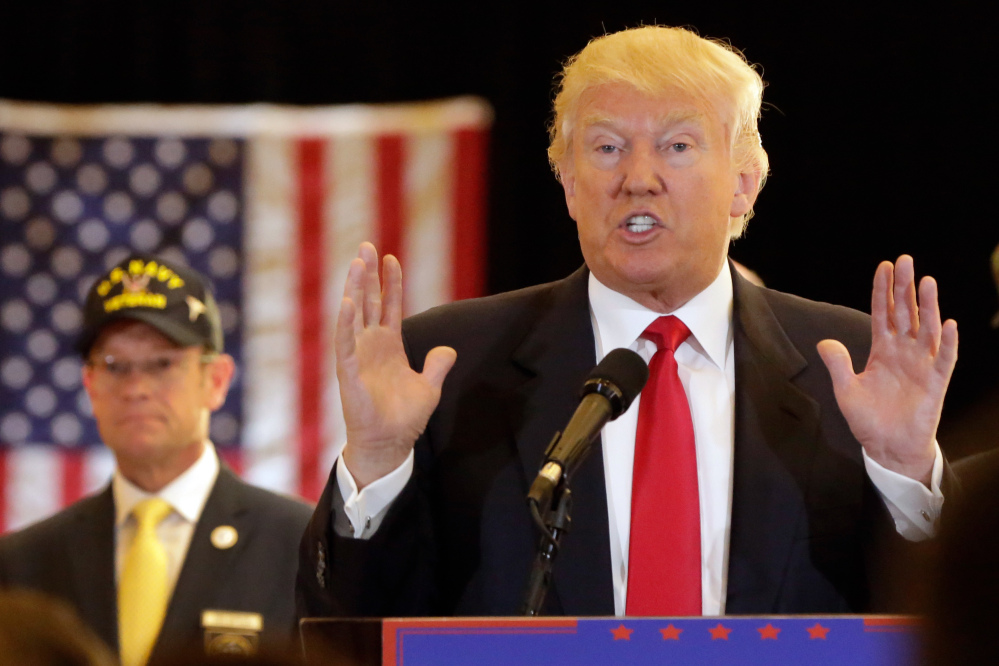WASHINGTON – Grand promises. Boundless boasts. Absolute faith in the man behind it all.
The strategies that Donald Trump’s now-defunct educational company used to woo customers have plenty of echoes of the presumptive Republican nominee’s current pitch to voters, based on newly disclosed court documents about Trump University. Hillary Clinton leapt on the parallels Wednesday, using them to cast Trump as a “fraud” who peddles false promises to Americans but cares only about his personal gain.
“He is trying to scam America the way he scammed all those people at Trump U,” Clinton said during a campaign stop in Newark, New Jersey. “It’s important that we recognize what he has done because that’s usually a pretty good indicator of what he will do.”
The new details about Trump University were revealed in documents released Tuesday as part of a trio of lawsuits accusing the businessman of fleecing students with unfulfilled promises to provide secrets of real estate success. Plaintiffs contend the organization gave seminars and classes across the country that constantly pressured customers to buy more and more but failed to deliver on promises of financial success.
TRIAL SET FOR NOVEMBER
Trump vigorously maintains that customers were overwhelmingly pleased with the offerings, and the documents do include testimony from several satisfied customers. His campaign released a video Wednesday featuring several people speaking positively about their experiences.
A case against Trump University in San Diego is scheduled to go to trial shortly after the November presidential election.
The documents released ahead of the trial underscore that, like the businessman’s presidential campaign, the selling point of Trump University was its namesake’s unshakeable self-confidence and his own personal success story.
The program’s 2009 playbook boasts that Trump is “the most celebrated entrepreneur on earth. He makes more money in a day than most people do in a lifetime.” Another manual boasts that “The Trump University Team is truly the best of the best, however Retreat & Special Events Team Members are the crème de la crème of the best of the best.”
The playbooks, which are guides for those running the Trump University seminars, are chock-full of advice on how to seal the deal with prospective students, including painstakingly specific instructions on seminar room setups and music selections, reminiscent of the attention to detail given to the stagecraft at the candidate’s signature campaign rallies.
An operating guide for supervisors contains “Sales Wisdoms” that appear to echo Trump’s speaking strategy at his rallies at which he rails about the nation’s problems – from immigration to trade deals to the death of the American dream – without offering much in the way of specific solutions.
‘YOU SELL FEELINGS’
“When you talk to customers, it usually works best if the subject is problems,” one document reads. Another declares “The customers must perceive the problem.” And a third makes clear “You don’t sell products, benefits or solutions – you sell feelings.”
The Trump University material also seems to foreshadow Trump’s run-ins with the media, offering tips for what organizers should do if a reporter attempts to conduct an interview at a seminar. Among the guidelines: “You don’t have to deliver what the reporter wants” and “Reporters are rarely on your side and they are not sympathetic.”
But Trump doesn’t always follow his school’s advice.
“Never disparage a competitor or competitive products … focus on the benefits of our programs and how they meet the needs of the client,” the school’s training manuals advises employees. Trump has reveled in disparaging his rivals, continuing to bash his former Republican competitors even after locking up the nomination.
As Trump steamrolled through the Republican primary, some of those rivals raised Trump University as a liability for the businessman, and at least five outside groups mentioned the business in attack ads. Florida Sen. Marco Rubio also used Trump University in his campaign speeches in an attempt to blunt the real estate mogul’s political rise.
“It was targeted at people that were struggling,” Rubio said in March. They were retirees, single mothers and young people trying to start a business, he said. “They were people that were hurting, and they specifically targeted them.”
Rubio said last week that he’s eager to help the party defeat Clinton.
REPUBLICAN RIVALS TOO SLOW
While details about the business did little to slow Trump in the primary, Clinton allies say Republican candidates were too slow in raising concerns and inconsistent in their attacks. Clinton aides have vowed to avoid repeating those mistakes and officials said that Wednesday marked the beginning of a concerted campaign on the subject.
The centerpieces of the Trump-owned education organization were pricey seminars and other offerings that promised to share his business insights. Trump University offered a three-day seminar for $1,495, using it as a springboard to sell more expensive “Trump Elite” packages for up to $34,995 a year.
Trump University’s core customers are identified in the documents as male heads of households between 40 and 54 years old with annual household incomes of at least $90,000, a college education and a net worth of more than $200,000.
“If they complain about the price, remind them that Trump is the BEST!! This is the last real estate investment they will ever need to make,” a playbook read. For those who have hit credit limits, employees are told to suggest they dip into savings or identify other “seed capital.”
The playbook declared: “Money is never a reason for not enrolling in Trump University; if they really believe in you and your product, they will find the money.”
Associated Press writers David Porter in Newark, New Jersey, and Julie Bykowicz and Jeff Horwitz in Washington contributed to this report.
Send questions/comments to the editors.


